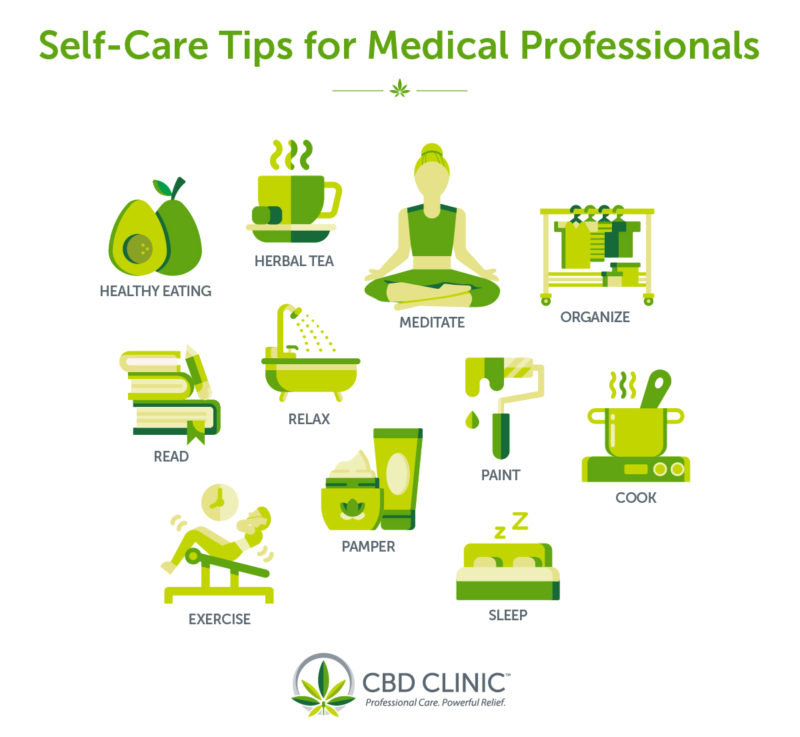The coronavirus pandemic has everyone feeling stressed, anxious, and possibly depressed. Healthcare practitioners may be feeling these emotions even more so. Whether you are still working or have shut your doors for the time being, the worry surrounding earning an income and how your business will survive can undoubtedly prove overwhelming.
Consequences of Neglecting Self-Care
Self-care can be a notoriously difficult task for those who are used to spending most of their time caring for others. However, as a healthcare practitioner, it is absolutely crucial for you to stay on top of your game so you can provide the best care for your patients. Whether you are still opening your office doors to patients or are temporarily out of work, dismissing self-care can lead to:
- A lack of self-interest, which can make caring for others difficult.
- Mental and physical health issues, such as depression, anxiety and low self-esteem, which can lead to poor job performance and/or poor relationships with others.
- Exhaustion and burnout, which can make performing your job more difficult
- Compassion fatigue, which can lead to a bad bed-side manner and a lack of empathy
- In more serious cases, secondary trauma (experiencing your patient’s trauma almost as if it happened to you).
Common Reasons Practitioners Don’t Take Care of Themselves
Often times when we spend our days caring for others, it can easy to forget to take care of ourselves. Some reasons for neglecting self-care include:
- Not seeing yourself as important as others when you’re programmed to think of others first
- Overwhelmed by work/life balance
- Fatigue and exhaustion, which can leave to a lack of healthy habits
If you are still employed, you need an outlet to unwind and decompress from the stresses that consume your day. If you are temporarily out of work, you need an outlet to process your emotions and occupy your time so negative feelings don’t spiral out of control.
It’s critical to integrate any number of the following tips into your daily life during the coronavirus pandemic. Write out a schedule and stick to it if you have to, but making sure you take time for self-care will not only benefit you but your clients, as well.

9 Self-Care Tips
1. Soak your troubles away
Helping to heal others can take its toll on you, which is why taking a nice bath filled with bubbles, Epsom salts, and essential oils like lavender, chamomile, or rose are so important to help calm your mind.
2. Soak in the sun and get fresh air
Being cooped up in the house all day is enough to send depression and anxiety levels skyrocketing. If you’re still employed, you might notice the hours have flashed by in a blink and you’ve barely taken a second to breathe.
At least once every day, it is vitally important you take yourself outside. Go for a walk or a run, if you have the time, or simply sit quietly and smell the air. Bask in the sun’s warmth for a few minutes – the vitamin D will do you good.
3. Phone a friend
Self-isolation has put a major damper on our social lives. Virtual happy hours have become a weekly ritual, and platforms like Zoom and Houseparty have found their way into our homes and onto our phones.
Reach out to loved ones who are alone or who you know may be prone to feelings of anxiety and depression. Video chats have become the new norm but even a simple text or phone call can help keep you connected to those close to you. Schedule weekly chats with friends and communicate with family members regularly. We truly are all in this together.
4. Maintain a healthy diet
The produce section of your local grocery store may look like it’s been pillaged, and eating healthy may be proving a little difficult. Opt for frozen fruits and vegetables if fresh ones aren’t available, or buy canned goods soaked in water rather than oil or syrup. It’s not impossible to maintain a healthy diet while you’re relegated to your house. It’s important to watch your portion control – schedule mealtimes and don’t hurry into the kitchen every single time the urge beckons. Limit the amounts of sweets and processed foods you consume and stick to foods high in fiber and antioxidants as much as you can. The fiber will help you feel fuller longer and antioxidants will give your immune system a kick.
As the time you spend in the house and away from the grocery store grows longer, you might have to…
5. Get creative in the kitchen
Pairing unlikely pantry items and turning them into a gourmet meal is not only a way to use up all the food in your house, but it’s also another option for channeling your energy into a creative endeavor. Cooking and baking can also be a bonding activity. Cook as a family or teach your kids how to bake your favorite dessert. Have a cook-off in the style of Top Chef where each participant has to make something delicious out of a particular set of ingredients.
6. Get motivated with an LTP (long-term project)
The precious gift of time we’re all suddenly imbued with is an excellent opportunity to take on that longer-term house project you’ve had your eye on completing, whether it be gardening or deep cleaning your kitchen. Or, take this opportunity to focus on the less physically hands-on aspects of your business. Take some continuing education credits such as those from LinkedIn Learning or offer virtual classes to others in your field. Boost your social media presence and use this time as an opportunity to digitally network.
7. The power of positive affirmations
Sometimes, we all need a little reminder to take care of ourselves. Why not physically remind yourself? Grab a post-it note and some Sharpie markers and leave yourself little self-affirming love notes all over the house. Your messages to yourself don’t have to wax too poetic and can say simple things like, “Don’t forget to take care of yourself today,” or “I am happy, healthy, and strong.” You could also set an alert on your phone, reminding you to, “Just breathe,” or telling you, “I am my own superhero.” Your positive affirmation could also take on the form of a prompt, such as “I am grateful for…” and then fill in the blanks with 3 things you are grateful for each day.
Positive affirmations have the power to change the way you think and can help elevate you out of the darker times you may be experiencing during this difficult time.
8. Get moving
Not only can exercise help keep you in great shape physically, but it can serve as a great stress reliever and benefit you mentally, as well. Any kind of exercise will do, especially if you are a healthcare worker who is still working and perhaps working longer, harder hours than ever before. Even ten minutes of stretching or walking will help you feel the effects. If you’re feeling frazzled, try yoga. Online sessions from Openfit are available to work within your timeframe, with classes as short as 10 minutes and as long as an hour and a half.
9. Go inward
Something else that can soothe frazzled nerves is to practice mindfulness. Mindfulness can be done anywhere, anytime. Integrating mindfulness into your daily life goes beyond sitting for a few minutes every morning in quiet contemplation. Mindfulness means being fully present in each moment, without judgment. That means avoid multitasking and instead focus on one task at a time.
Notice the breath. Is it short, quick, and choppy, or is it slow, deep, and even? Is the breath making its way all the way into your belly or is it residing solely in the chest? Beginning to notice such things can help you better manage your stress. Slowing down the breath equates to slowing down the mind.
Another aspect of mindfulness – and this is huge right now – is feeling your feels. Rather than burrowing feelings of anxiety, stress, and sadness, what would happen if you simply let yourself feel them as they arose? They would bubble up and out rather than linger and fester, potentially leading to more drastic mood swings, more depression, more anxiety, and more stress.
If you are interested in pursuing those few moments of quiet contemplation every morning, well, there is no better time to cultivate a meditation practice than right now.
If you don’t feel comfortable going the mindfulness or meditation journey alone, as with everything, there’s an app for that. Headspace is a great subscription-based app that not only provides guided meditations but also provides overall tips on how to be more mindful in your daily life. Calm and Insight Timer are other popular apps helping people log some serious meditation time. Finally, the UCLA Mindful Awareness Research Center is a wonderful resource for guided meditations to accommodate your schedule, whether you have 3 minutes, or you have 20.
The Importance of Self-Care
While you are usually busy taking care of your patients or clients, take this strange bubble in time to care for yourself. Whatever your method(s) of self-care, don’t forget to schedule time in your day for your mental health. Try mixing up a few of the methods included here and you’ll see not only how fast your mood and outlook can improve, but how much more energy you can put into caring for your patients. It’s a win-win!
Want to connect with other healthcare professionals for support?
You are invited to join our community on Facebook, Instagram, Twitter, and LinkedIn . If you are a licensed healthcare professional, you are also invited to join our exclusive private group.


